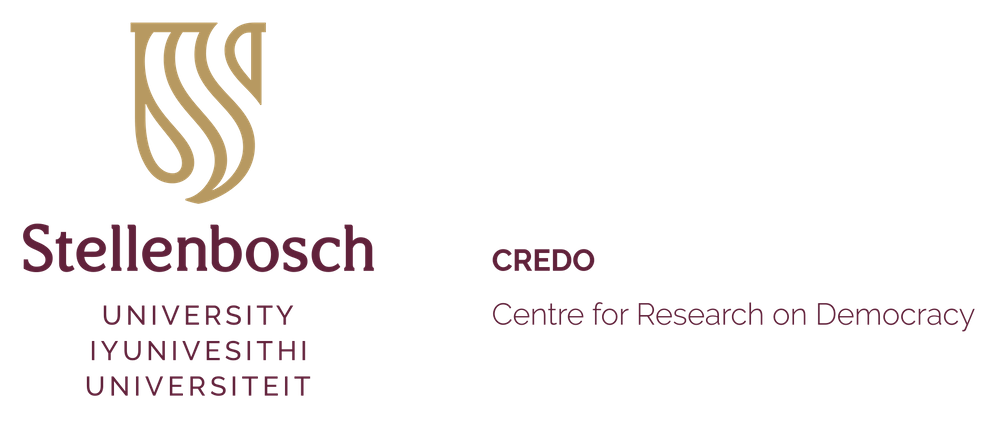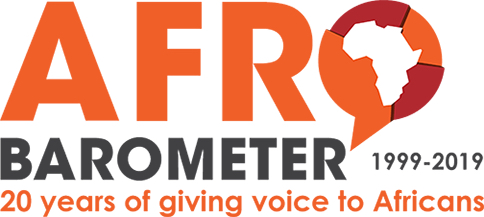We work with leading partners in democracy studies.
Afrobarometer
The Afrobarometer Network is a series of partnerships between survey researchers based mainly in Africa. Our main types of partnerships are:
- National partners – these are organisations (or individuals) who are responsible for conducting all in-country survey activities
- Core partners – these are institutions that manage and provide assistance to our national partners in their region
- Support units – these are university-based teams that provide technical support to our core partners and Executive Committee.
- Executive committee – The Afrobarometer Executive Committee meet 2-3 times a year and oversees all aspects of the Afrobarometer network including fundraising, programme planning and implementation and network management. It also confirms decisions about new survey countries and any major structural or staff changes. All members of the Executive Committee are tasked with implementing decisions made by the Committee.
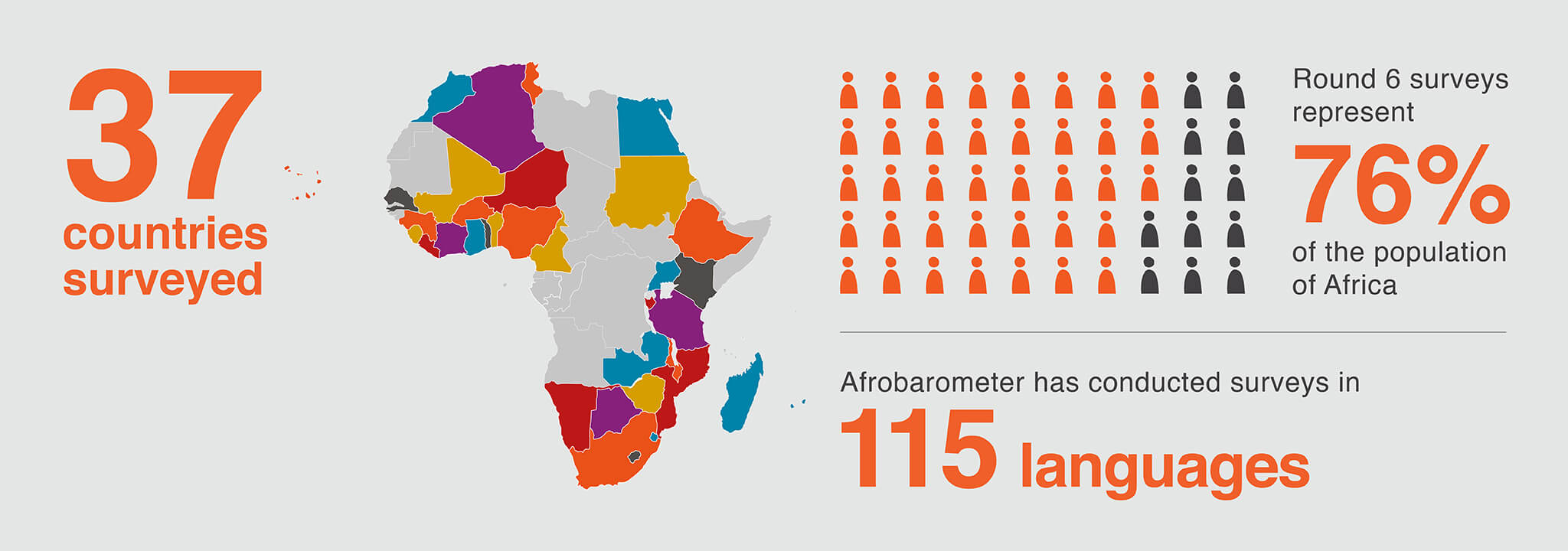
Afrobarometer History
1999
- Three independent survey research projects, led by Afrobarometer co-founders Dr Michael Bratton, Dr Robert Mattes, and Dr E Gyimah-Boadi, merge to form the Afrobarometer. The three core partners are: Michigan State University, Institute for Democracy in South Africa (Idasa), and the Center for Democratic Development in Ghana (CDD-Ghana). Dr. Michael Bratton is Afrobarometer executive director.
- Round 1 surveys begin covering 12 countries: Botswana, Ghana, Lesotho, Malawi, Mali, Namibia, Nigeria, South Africa, Tanzania, Uganda, Zambia, Zimbabwe.
2000
- Afrobarometer joins other regional barometers to form the Globalbarometer network.
2001
- Round 1 survey completed.
2002-2003
- Round 2 surveys in 16 countries. New countries added: Cape Verde, Kenya, Mozambique and Senegal.
2004
- Afrobarometer receives “Best Data Set Award 2004” from the American Political Science Association.
2005
- Round 3 surveys begin in 18 countries. New countries added: Benin and Madagascar.
- First Afrobarometer book published: Michael Bratton, Robert B Mattes and Emmanuel Gyimah-Boadi, Public opinion, democracy, and market reform in Africa, Cambridge, New York: Cambridge University Press.
2006
- Round 3 surveys completed.
- Round 3 Global Release held.
2007
- Afrobarometer conference on “The Micro-Foundations of Mass Politics in Africa” held in East Lansing, Michigan, USA.
- CDD Ghana becomes the Network’s headquarters.
2008
- Round 4 surveys begin in 20 countries with addition of: Burkina Faso and Liberia.
- Dr Gyimah-Boadi of CDD-Ghana takes over as executive director .
- Institute for Empirical Research in Political Economy (IREEP) in Benin becomes core partner for francophone Africa.
- Michigan State University and University of Cape Town both become support units.
- Afrobarometer publishes its 100th working paper, “The Trans-Atlantic Slave Trade and the Evolution of Mistrust in Africa: An Empirical Investigation”, by Nathan Nunn and Leonard Wantchekon.
2009
- Round 4 surveys completed.
- Afrobarometer Round 4 Global Release takes place.
2010
- Afrobarometer Policy Conference on “The Use of Empirical Evidence in the Policy Process” held in Accra, Ghana.
- Globalbarometer develops its first global question module on attitudes toward democracy, to be included in Afrobarometer Round 5 questionnaires.
2011
- Round 5 surveys begin in 35 countries with addition of: Algeria, Burundi, Cameroon, Cote d’Ivoire, Egypt, Ethiopia, Guinea, Mauritius, Morocco, Nigeria, Sierra Leone, Sudan, Swaziland, Togo, and Tunisia.
- Afrobarometer establishes a partnership with Arab Barometer to conduct surveys in five North African countries during Round 5.
- Institute for Development Studies (IDS) at University of Nairobi becomes core partner for East Africa.
2013
- Round 5 surveys completed.
- Institute for Justice and Reconciliation (IJR) in South Africa becomes new core partner for Southern Africa.
- Round 5 Global Release begins in Johannesburg, South Africa.
- Second Afrobarometer book published: Michael Bratton (ed.) Voting and Democratic Citizenship in Africa, Boulder: Lynne Rienner Publishers.
2014
- Round 5 Global Release concludes in Bamako, Mali.
- Round 6 surveys begin in more than 35 countries, with addition of Gabon.
2015
- Round 6 surveys completed.
2016/2017
Round 7 surveys begin
2018
- R7 surveys completed
- Disseminations of R7 survey findings completed in Mali, Nigeria, Tanzania, Ghana, Mauritius, Burkina Faso, Gabon, Togo, Namibia, Lesotho, eSwatini, Cameroon, Liberia, and the Gambia
- Anglophone Summer School held at University of Cape Town, South Africa
- The first R7 Pan-Africa Profile formerly Global Release on Africans’ priorities, the SDGs, and government performance released in Ghana.
- Animations/videos on preliminary R7 survey findings on migration and on citizen priorities and the SDGs
2019
- Dissemination of R7 in-country findings continues in Morocco, Mozambique and Niger
- Pan-Africa Profiles continues
- Celebrated 20th anniversary with performance awards recognising eight national partners
- Launched as a non-profit organisation registered and headquartered in Accra, Ghana. Regional offices in Accra (CDD Ghana), Cape Town (IJR), Nairobi (IDS, University of Nairobi)
Varieties of Democracy
Varieties of Democracy (V-Dem) is an international research project that aims to provide a more comprehensive and comparative measurement of democracy across the world and through time. Launched in 2011, the project started by bringing together more than two dozen of the world’s top theorists of democracy in order to develop a multi-dimensional approach to conceptualizing and measuring this most salient phenomenon of our time. In particular, the project pioneered a five-part model of democracy, starting with electoral democracy (or polyarchy as originally theorized by Robert Dahl), and thereafter covering deeper aspects such as liberalism, egalitarianism, participation and deliberation.
By 2013 this theoretical work yielded the first versions of an unprecedented framework of over 400 indicators that could be measured via either existing sources or new expert surveys in order to yield a dataset that could truly capture democracy’s many facets and levels. The project then developed an extraordinary network of more than 2500 collaborators (academics, practitioners, country-experts) in order to code and verify these variables not only for some 175 countries around the globe, but also for each year going back in time until 1900. Moreover, V-Dem was the first dataset to code colonial and other dependent territories across such an extensive period of time. In February 2016, the first public version of the V-Dem dataset was made available to the public and it has been continually updated ever since. In April 2018, the timeframe of the dataset was extended further back to 1789, encompassing a number of historical polities for comparison.
Institutionally, the project was launched originally at the Kellogg Institute of International Studies, Notre Dame University. Over time, most of the organizational work was shifted to Gothenburg University, where a dedicated V-Dem Institute was opened. Additionally, the project has spawned a number of regional centres, where scholars organize V-Dem research with a regional focus.
The Principal Investigators of the project have been Michael Coppedge (Notre Dame), John Gerring (University of Texas, Austin), Staffan Lindberg (Gothenburg University), Svend-Erik Skaaning (Aarhus University), Carl Henrik Knutsen (Oslo University) and Jan Teorell (Lund University). More than 30 researchers and staff have assisted in managing the project, initially at Notre Dame and today in Gothenburg. Through yearly updates of the dataset, V-Dem also keeps in service its network of collaborators, which now totals more than 3000 people.
In 2016 V-Dem was conferred the Lijphart/Przeworski/Verba Data Set Award by the Comparative Politics Section of the American Political Science Association.
V-Dem Database
In contrast to other democracy indices, V-Dem is a unique database consisting of a series of measures of what democracy is or ought to be. The V-Dem database provides 450+ unique, disaggregated indicators of various aspects democracy and 5 distinct indices of democracy: electoral-, liberal-, participatory-, deliberative-, and egalitarian democracy. It also includes more than 80 indices for various components of democracy. The resulting database consisting of about 27 million data points is the largest of its kind, and make possible both highly detailed, nuanced analysis of virtually all aspects of democracy in a country, and quick, summary comparisons between countries based on aggregated indices for varieties of democracy. The dataset covers 202 countries from 1789-today and is updated annually. V-Dem is the recipient of the Lijphart/Przeworski/Verba Dataset Award 2016. The data is free of charge for download and also available for online graphing.
All data is downloadable from the V-Dem website is a public good. In addition to the data being available for download, V-Dem has developed a set of online resources for analysing, tracking and benchmarking of strengths and weaknesses of democracy in all countries. Users from anywhere are able to use sophisticated but intuitive and accessible online analysis tools. Students and media across the world will benefit from the nuanced comparative and historical data. Governments, development agencies, and NGOs will be able to make much better informed decisions, and even go back in time to re-evaluate aid efforts.
Methodology
V-Dem draws on theoretical and methodological expertise from its worldwide team to produce data in the most objective and reliable way possible. Approximately half of the indicators in the V-Dem dataset are based on factual information obtainable from official documents such as constitutions and government records. The other half consists of more subjective assessments on topics like political practices and compliance with de jure rules. On such issues, typically five local Country Experts provide ratings for each country-year-indicator. To date, V-Dem has worked with more than 3,000 Country Experts from all over the world.
V-Dem works closely with leading social science research methodologists and has developed a state of the art measurement model that, to the extent possible, minimizes coder error and addresses issues of comparability across countries and over time. V-Dem also draws on the team’s academic expertise to develop theoretically informed techniques for aggregating indicators into mid- and high-level indices. In this sense, V-Dem is at the cutting edge of developing new and improved methods of social science measurement.
What makes V-Dem different?
In order to better conceptualize and measure democracy, the V-Dem project:
- Distinguishes among 5 high-level Principles of Democracy: Electoral, Liberal, Participatory, Deliberative, and Egalitarian
- Disaggregates these into dozens of lower-level Components of Democracy such as elections, judicial independence, direct democracy, and gender equality, and provides disaggregated indicators for each conception and each component.
- Covers all countries (and some dependent territories) from 1900 to the present, whenever possible, and provides an estimate of measurement reliability for each rating. For about 80 countries, data is provided from 1789 to the present.
- Makes all ratings public, free of charge, in a user-friendly interface.
- Produces Democracy Report on an annual basis.
These features, taken together, distinguish V-Dem project from other democracy indices.
Benefits of V-Dem
Through a systematic, historical, and disaggregated approach V-Dem:
- Provides a full set of indices for each conception and component.
- Allows scholars and practitioners to construct their own indices to suit their own purposes, exploring relationships among very specific elements of democracy over long periods of time.
- Advances our understanding of the historical process of democratization, shedding light on the sequences by which regimes have developed over the past century, and perhaps providing a glimpse into future.
- Advances our understanding of the causes and effects of democracy, the extent to which regime type matters in the world today.
- Allows for more nuanced understanding than present indicators currently allow.
- Assists governments, development agencies, and NGOs with country assessments, design of effective programs, and evaluation of the impact of development assistance in the democracy and governance (D&G) area.
V-Dem Release: Data set V9
Scholars, policy makers and journalists from around the world are using data from the Varieties of Democracy (V-Dem) Project in order to understand the current challenges to democracy. Today, the V-Dem Institute has released an updated version of its award-winning dataset covering 202 countries from 1789 to 2018
The new data shows the state of democracy in 2018 and that the global trend of democratic declines continues in 2018. By end of 2018, liberal democratic institutions are eroding noticeably in 24 countries. Many of these countries, such as Brazil, Czech Republic, India, Hungary, Poland, and the United States, are established democracies, and populous. They are home to one third of the world’s population.
2019’s Democracy Report will be published in May. Anna Lührmann, V-Dem Deputy-Director, provides a preview of the main findings of the report: “Democracy is in decline in an unprecedent high number of countries around the globe. This is worrisome. At the same time, the resilience of most democracies in the light of global challenges – digitalization, immigration, financial crisis – gives reason to be optimistic about the future of democracy.”
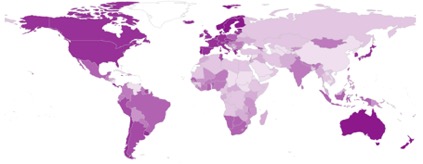
This year’s new data includes brand new indices and indicators measuring digital society, legitimation and exclusion. The V-Dem data can help to address questions such as: What was democracy like 200 years ago, and what’s the status of democracy today? What is “exclusion” and how does it manifest in societies? Is digital media a challenge to democracy?
Overview of V-Dem Dataset V9
- Online graphing via V-Dem Graphing Tools: https://www.v-dem.net/en/analysis/
- Free download (SPSS, STATA, CSV, R): https://www.v-dem.net/en/data/data-version-9/
- Countries: 202 with coverage 1789-2018
- 450+ indicators, 81 indices and 5 high-level indices
- New indices and indicators on digital society, legitimation and exclusion
- Based on 3,000+ local Country Experts from all around the world
Website:
World Values Survey
World Values Survey (WVS) is a global research project that explores people’s values and beliefs, their stability or change over time and their impact on social and political development of the societies in different countries of the world.
WVS started in 1981 and quickly became one of the most widely-used and authoritative cross-national and time-series surveys covering almost 110 societies or nearly 92% of the world’s population.
WVS shows pervasive changes in what people want out of life and what they believe. In order to monitor these changes, WVS has executed six waves of surveys from 1981 to 2014. Representative national samples of each society are interviewed, using a standardized questionnaire that measures support for democracy, tolerance to foreigners and ethnic minorities, support for gender equality, the role of religion and changing levels of religiosity, the impact of globalization, attitudes toward the environment, work, family, politics, national identity, culture, diversity, insecurity, subjective well-being, and others.
In 2017, the next 7th round of WVS survey commenced. By early 2020, WVS team plans on conducting the survey in up to 80 world countries and societies. Round 7 will provide new data on social, political, economic, religious values; trust to social and political institutions, social exclusion, security, tolerance, migration, corruption, development of science and technology, international organizations and much more.
The WVS seeks to help scientists and policy makers understand changes in the beliefs, values and motivations of people throughout the world. Thousands of political scientists, sociologists, social psychologists, anthropologists and economists have used these data to analyse such topics as economic development, democratization, religion, gender equality, social capital, and subjective well-being. These data have also been widely used by government officials, journalists and students, and groups at the World Bank have analysed the linkages between cultural factors and economic development.
The findings are valuable for policy makers seeking to build civil society and democratic institutions in developing countries. The WVS data is also frequently used by governments around the world, scholars, students, journalists and international organizations and institutions such as the World Bank and the United Nations.
History of the World Values Survey Association
The World Values Surveys were designed to test the hypothesis that economic and technological changes are transforming the basic values and motivations of the publics of industrialized societies. The surveys build on the European Values Study (EVS) first carried out in 1981. The EVS was conducted under the aegis of Jan Kerkhofs and Ruud de Moor and continues to be based in the Netherlands at the Tilburg University. The 1981 study was largely limited to developed societies, but interest in this project spread so widely that surveys were carried out in more than twenty countries, located on all six inhabited continents. Ronald Inglehart of the University of Michigan played a leading role in extending these surveys to be carried out in countries around the world. Today the network includes hundreds of social scientist from more than 100 countries.
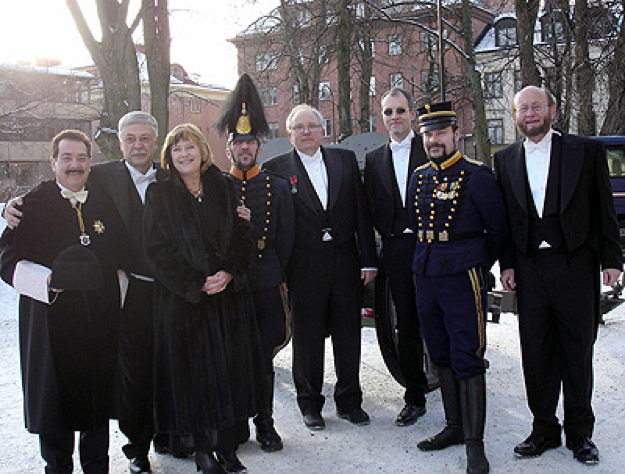
Prof. Yilmaz Esmer (second from left) is a current member of TRU, as was the late Prof. Thorleif Pettersson (fourth from the right). The founder of the WVS is Prof. Ronald Inglehart, shown on the photo on the far right.
Findings from the first wave of surveys pointed to the conclusion that intergenerational changes were taking place in basic values relating to politics, economic life, religion, gender roles, family norms and sexual norms. The values of younger generations differed consistently from those prevailing among older generations, particularly in societies that had experienced rapid economic growth. To examine whether changes were actually taking place in these values and to analyze the underlying causes, a second wave of WVS surveys was carried out in 1990–91. Because these changes seem to be linked with economic and technological development, it was important to include societies across the entire range of development, from low income societies to rich societies.
A third wave of surveys was carried out in 1995–97, this time in 55 societies and with increased attention being given to analysing the cultural conditions for democracy. A fourth wave of surveys was carried out in 1999–2001 in 65 societies. A key goal was to obtain better coverage of African and Islamic societies, which had been under-represented in previous surveys. A fifth wave was carried out in 2005–07 and a sixth wave has been completed in 2010-2014. The next, 7th wave, is planned for 2017-2018.
Due to the European origin of the project, the early waves of the WVS were eurocentric in emphasis, with little representation in Africa and South-East Asia. To expand, the WVS adopted a decentralised structure in which social scientists from countries throughout the world participated in the design, execution and analysis of the data, and in publication of findings. In return for providing the data from a survey in their own society, each group obtained immediate access to the data from all participating societies enabling them to analyse social change in a broader perspective
The WVS network has produced over 1,000 publications in 20 languages and secondary users have produced several thousand additional publications. The database of the WVS has been published on the internet with free access.
The official archive of the World Values Survey is located at ASEP/JDS, Madrid, Spain.
WVS activity is coordinated by World Values Survey Association (WVSA). WVSA is a non-profit research organization.
http://www.worldvaluessurvey.org/WVSContents.jsp?CMSID=Home
WVS wave 7
Design of the WVS-7 questionnaire has been a lengthy process which required efforts and contributions from all the WVS network members and beyond. Questionnaire drafting has been started in April 2014. Final version of the questionnaire has been finalized in December 2016 with the survey fieldwork commencing already in January 2017.
Similar to the previous waves, WVS-7 questionnaire is an extensive research tool comprising of 290 questions and measuring cultural values, attitudes and beliefs towards gender, family, and religion, attitudes and experience of poverty, education, health, and security, social tolerance and trust, attitudes towards multilateral institutions, cultural differences and similarities between regions and societies. In addition, the WVS-7 questionnaire has been elaborated with the inclusion of such new topics as the issues of justice, moral principles, corruption, accountability and risk, migration, national security and global governance.
Given the longitudinal character of the WVS research program, a number of survey items refering to social, political, economic and cultural values and norms as well as batteries measuring post-materialist index are replicated from the previous waves. The approximate proportion between the longitudinal versus new questionnaire elements is 60% to 40%.
WVS-7 survey round is also contributing towards monitoring the set of Sustainable Development Goals and the targets defined by the UN post-2015 agenda. WVS-7 questionnaire contains over 100 indicators allowing to assess the status of SDGs 1 (no poverty), 2 (zero hunger), 3 (good health and wellbeing), 4 (quality education), 5 (gender equality), 8 (decent work and economic growth), 11 (sustainable cities and communities), 13 (climate action), 16 (peace, justice and strong institution), 17 (partnerships for the goals).
WVS-7 questionnaire is structured along 14 thematic sub-sections, including demography, as following:
- social values, attitudes & stereotypes (45 items);
- societal well-being (11 items);
- social capital, trust and organizational membership (49 items);
- economic values (6 items);
- corruption (9 items);
- migration (10 items);
- post-materialist index (6 items);
- science & technology (6 items);
- religious values (12 items);
- security (21 items);
- ethical values & norms (23 items);
- political interest and political participation (36 items);
- political culture and political regimes (25 items);
- demography (31 items).
Questionnaire as well as the data and all the other survey related materials will be made available for broad public early in 2020.
WVS-7 master questionnaire is designed in English with the centrally prepared translations into several major languages (Arabic, Spanish and Russian) being offered by the WVSA Secretariat. Unless the centrally translated version is suitable, all WVS national surveys teams are in charge to prepare the translations into their national language(s) in their respective country. In any given country, the questionnaire must be translated into all languages which serve as the first language for 15% (or more) of the population. For countries that participated in previous waves of the World Values Survey, translation for the replicated items is used from the previous wave questionnaires to minimize bias during overtime comparsion of answers distributions.
WVS requires implementation of the common questionnaire fully and faithfully, in all countries included into one wave. This is the main condition which ensures over-time comparison of the collected data and is the main criteria for inclusion of each national data-set into the WVS-7 aggregated data-file.
Methodology
WVS-7 sample model applied in a country must correspond the following criteria:
- WVS surveys are required to cover all residents (not just citizens) in a country in the age of 18 years older and older;
- PI’s can lower the minimum age limit as long as the minimum required sample size for the 18+ population is achieved;
- Obtained sample should be representative, i.e. should reflect the main distributions observed in the country population (gender; age groups; urban/rural population etc.).
The sample type preferable for using in the World Values Survey is a full probability sample of the population aged 18 years and older.
Probability sampling is a sampling technique wherein the samples are gathered in a process that gives all the individuals in the population equal chances of being selected.
In most cases, a list or registry of all households or voters in the country is required to build a full probability sample. Recognizing that the very high cost of full probability samples may prove prohibitive in some cases, WVSA allows application of a national representative random sample based on multi-stage territorial stratified selection.
Stratified sampling is a probability sampling technique wherein the entire population is divided into different subgroups or strata, then randomly selects the final subjects proportionally to its population from the different strata. If the multi-stage sample designs are applied, selection of primary sampling units (PSUs) forms the first stage and the selection of, for example, households within selected PSUs follows at the second stage of sampling. For the second stage, simple probability sampling is used.
Depending on concrete conditions in the country, other sample design models are possible and have to be discussed with the WVSA Scientific Committee.
Every national team develops their sampling model according to the country peculiarities (geographical and administrative division, size of urban and rural population, available statistica data etc.) and existing WVSA methodological requirements.
There are three main groups of countries in the WVS-7 depending on their sample size:
- the minimum acceptable sample size – i.e. the number of completed interviews which are included into the national data-set in vast majority of countries is 1200;
- for countries with the population of less than 2 million a sample size of 1000 respondents is acceptable;
- countries with bigger population and greater population distribution (Russia, China, Brazil, USA etc.) should aim at bigger sample size of minimum 1500 respondents.
The WVSA relies on national team’s experience with regard to the optimal national sample size in a particular country.
The main method of data collection in the WVS survey is face-to-face interview at respondent’s home / place of residence. Respondent’s answers could be recorded in a paper questionnaire (PAPI) or via CAPI (Computer Assisted Personal Interview).
Application of other methods of data collections (Internet panel, postal interview, telephone interview) is possible though requires justification by the survey team and assurance of the 95%+ population coverage. Possibility of application of any alternative survey methods rather than PAPI and CAPI is considered on the country by country basis and requires approval of the WVSA Scientific Committee. Same requirements and procedure are valid for application of mixed survey method.
Global Barometer Surveys
Global Perspectives – Local Concerns
Global Barometer Surveys (GBS) is a collaborative research project consisting of six regional barometers. It is the first comprehensive effort to measure, at a mass level, the current social, political, and economic climate around the world. It provides an independent, non-partisan, scientific and multidisciplinary view of public opinion on a range of policy-relevant issues. Currently, the GBS network covers 70% of the world’s population and is still expanding.
The GBS represents an indigenous initiative to develop a global intellectual community for the study of democracy by surveying ordinary citizens. The project’s agenda is built on the premises that public attitudes and orientations toward democracy are crucial to the process of political legitimacy and that political culture operates autonomously as a key factor mediating the impact of socio-economic modernization on the evolution of the political regime, particularly in democracies. Originally inspired by the Eurobarometer, which was funded in the 1970s to track mass attitudes in what was then the European Community, new regional barometers emerged, developing innovative approaches that are adapted to regions around the world undergoing rapid political and economic change. The GBS now cover six regions, including Africa (Afrobarometer), East and Southeast Asia (Asian Barometer), South Asia (South Asia Barometer), Central and South America (Latinobarómetro), the Middle East (Arab Barometer), and countries of former Soviet Union (Eurasia Barometer). As more regions join the GBS network, a standard approach is being established to ensure that data is comparable and reliable. Before the launch of the GBS in 2004, the survey instruments adopted by the different barometer surveys, while sharing the common research agenda of exploring citizens’ attitudes toward democracy, governance and political reform, were not strictly comparable due to differences in format and wording. Over the years, the GBS has established standardized questionnaire modules across regions, while also allowing regional barometers to retain their own region-specific items that reflected particular local concerns.
Data analytics provided by VoxCroft
VoxCroft builds government-grade media analytics and political security risk insight products and technologies for private- and public-sector clients. Their team has 40+ years of combined experience crafting state-of-the-art methods and machine intelligence technologies that extract actionable insights from traditional, social, and other open media sources. Find out more at VoxCroft.com.
